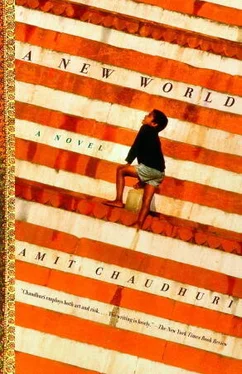The ornate Bengali announcements startled Jayojit mildly; and Bonny remained tense and excited all through the take-off. Once they were in the air, he shouted to his father:
“Are we flying, baba?” He looked concerned.
“That’s right.”
A woman came down the aisle with a tray in her hand; the aircraft was still tilted upward, and she made a cautious descent down the slope. Arms rose from the seats towards the glasses of orange juice. “Thank you,” said Bonny to the smiling woman when he’d got his; they drank it eagerly — it was sour and bitter.
Getting up to go to the toilet, Jayojit looked round to see if there were any Indian Bengalis on the plane. There they were — so easy to identify, myopic, the men slight and in nondescript Western clothes, the women betrayed by the telltale trace of vermilion in their hair. Surrounded by the Bangladeshis, with their large families talking loudly, many of the children already fast asleep, the women heavily bangled, trinkets shining on their ears and noses, young men in smartly tailored suits, old men with goatees.
When Jayojit had returned to his seat, Bonny said to him:
“Baba, this tooth’s giving me trouble !”
“Is it?” he said. “Don’t prod it with your tongue, Bonny. You’ll find, suddenly, that it’s fallen off by itself.”
A man in a skull cap, with streaks of grey in his beard, rose unhurriedly from his seat.
A little later, Bonny took off his earphones and said:
“How long’s it been, baba? An hour?”
Jayojit looked at his watch.
“Only twenty minutes, I’m afraid, partner,” he said.
“Only twenty minutes ? You mean not even thirty minutes ?”
“That’s right.”
Later, Bonny asked:
“Is it an hour now?”
“Still twenty minutes to go.”
“Oh God!”
Jayojit unzipped his bag and took out the Asian Age . Beneath it, there was a lump of gur that his mother had kept aside in the fridge from March, wrapped in newspaper and stored in a polythene packet — she’d been firm in her belief that the American customs men would look upon it kindly and let it through. It was like a clod of earth — it would certainly confuse them. “You mean you eat this?” they’d say. Far away at the back a boy was retching, and near Jayojit, in the same row, a woman in a sari was exhorting her child to sleep, while another, older child, looked on at her brother. He couldn’t help listening to the woman. Although the paper lay open on his lap, he stared blindly at the cartoon of a rotund politician, and, turning a few pages, couldn’t concentrate on what the editorial said about the decline of the Congress party. When the child became quiet after ten minutes, he looked at the cartoon with new eyes, made the sound of a laugh, and then decided to give the editorial a second chance.











